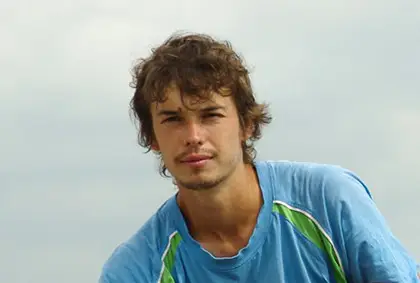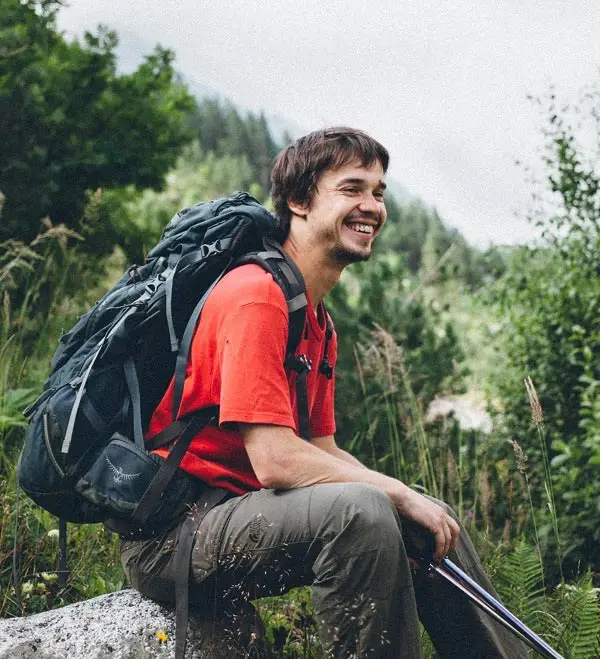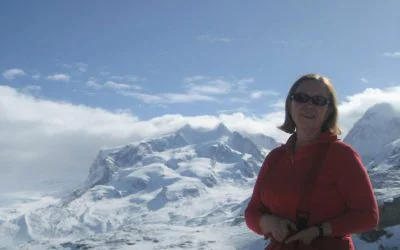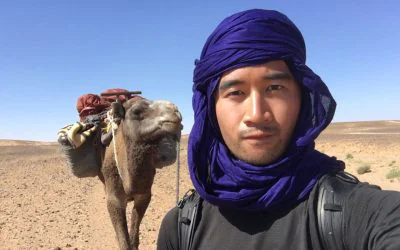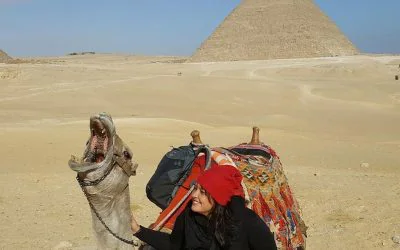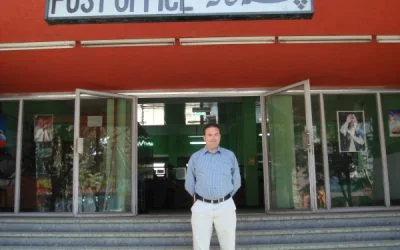Dmitry tell us something about your own background and how your interest in travelling began.
When I was 16, I read books of Jack Kerouac, listened to records of Janis Joplin and was involved in the Russian hippie community. I dreamed about travelling. I read a book of Anton Krotov, the most famous Russian hitch-hiker, about the hitch-hiking technique and started traveling…
I was never interested in collecting territories, I love adventures, the taste of being a pioneer and meeting remarkable people. I studied management in the university. But I was not really interested in that. My life was about travelling, rock-n-roll and yoga practices. But after I met a teacher of project-management, I understood that I can make travel-projects! I travelled till 2009 trying to find myself… And in 2009 I became ready for something real. A friend and I started making a guide-book about the new countries in the Caucasus – Abkhazia, South Ossetia and Nagorno-Karabakh. That project led us to the creation of “Caucasus explorer”.
You are the Founder of Caucasus Explorer. What are some of the challenges you face operating in this region?
We are two co-founders at Caucasus explorer. I’m responsible for the Northern Caucasus. So I will tell about the North. Till now most of the places there are very real. I mean…
When you travel worldwide you can see that territories are losing their uniqueness, and tourists usually don’t touch the reality, they see the facade made specially for tourists. So what are people travelling for? In the olden days travelling was the way to touch something different, to jump into a situation full of uncertainty and freedom! That was the way to clean the mind from the conventions of one’s own culture and find the reality, find the real self.
And I love the Northern Caucasus because it is real till now. Of course the travel industry is coming. And there are few places which became resorts even in the 19th century. But when you travel in most of the regions here you see real life and you become a real guest of the people, not a tourist or a client.
And my biggest concern is how to develop tourism here not hurting traditional culture. It’s like going on a rope over an abyss. I have to be a master of intercultural communications. Sometimes local people accept travellers as guests but they are not travellers, they are tourists who expect services and are afraid of being cheated. That hurts hearts and my relations with locals. Sometimes locals are so passionate in their hospitality, they cannot understand that travellers want to see many places and cannot spend too much time in one place. And every time I have to find a way to satisfy both sides.
But also I have down-to-earth, uninteresting difficulties… Border-zone permits! It takes 60 days to get them and success is not guaranteed. South Ossetia is a very closed country, unlike North Korea they don’t have a сlear and stable permit-issuing procedure till now. They say that the process takes one month but really it can take up to 3 months and it is very expensive. And also the Russian visa, which is expensive, difficult and takes a long time! If Russia starts giving a visa on the border, thousands of tourists travelling in Georgia will come to Ingushetia to see the unique Vainakh towers…
And I always get asked about security. I don’t understand why. Wars in the Caucasus finished 10 years ago. We have less terrorist attacks here than in Europe. But people still compare Chechnya and Dagestan with Afghanistan and Iraq!
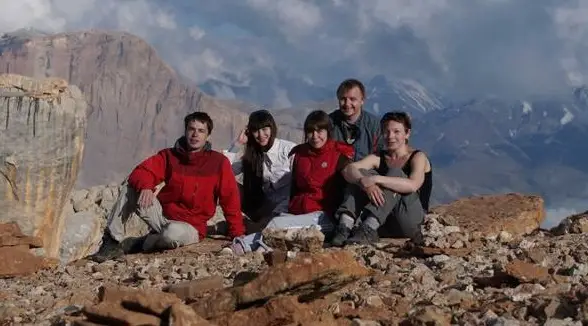
Hiking at Shalbuzdag Mountain, Dagestan
Tell us something about the trips you offer.
I almost don’t make group tours. I work with good foreign agencies like Wild Frontiers, MIR, Native Eye, Spiekerman, Sztajn2go from Brazil, Batuta from Netherlands. And now I’m going to contact adventure companies in China, Taiwan and Hong Kong.
Sometimes individual travellers write me and I try to understand what they want. So I try not to offer something, but to satisfy my guests.
But of course my personality influences the spirit of all tours. I always try to create adventures, to make people feel the reality of what is happening. And I like to create varied experiences. I was shocked when one of my guests told me that she hates Armenia. I asked her why. And she answered, that she was killed by a week (!) of travelling from monastery to monastery and from church to church! Of course! I would hate Armenia too. In North Caucasus I like to explore all aspects of life and find fun away from the main tourist routes. And I’m never satisfied by observing, I like participating, because only the destruction of boundaries can touch people’s hearts.
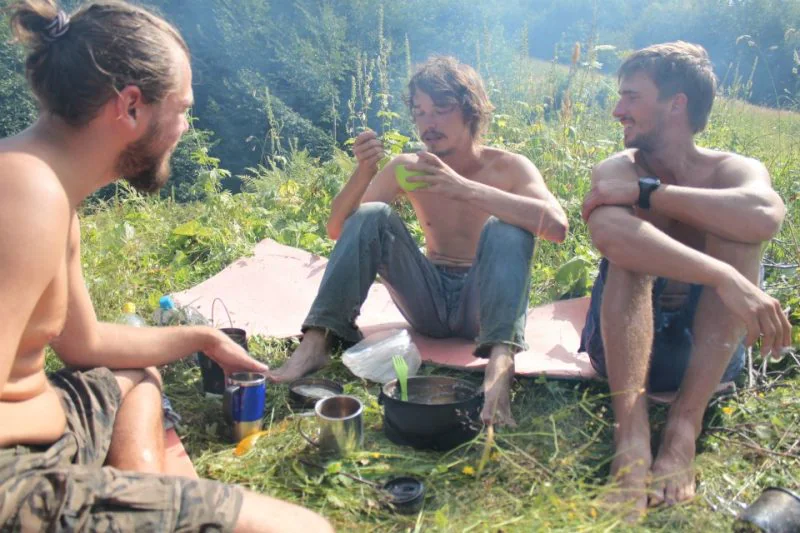
Exploring Abkhazia
Which town is your home? What is it like living there?
I live in Zelenograd. That is a small town near Moscow. It was like Silicon valley in the USA. My father worked in the factory making microchips. But when the Soviet Union collapsed everybody understood that they are making macrochips 🙂 And the factory closed. But the town is still very nice – green and calm, We have a forest (I mean that, it’s not a park!) in the middle of the town. And Moscow is really near, so I feel I live in one of the most energetic places in the world.
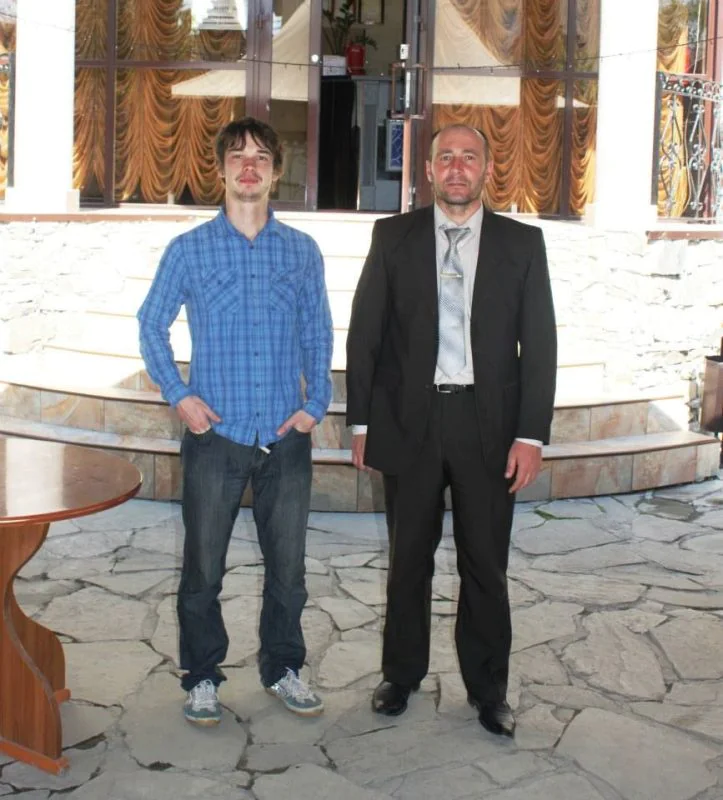
With a driver in Grozny, Chechnya
You are also a tour guide. What are the good and bad things of this profession?
I have a family and it hurts relations with my son and wife. So I’m trying to work as a guide less and less. And also I see that most people working as guides for many years become too rough and lose the feeling of adventure. I have not seen many guides, who retained the feeling of travelling together with guests. I don’t want to lose that too!
What about good things… I think there is one but very important reason to be a guide. This profession makes me travel!
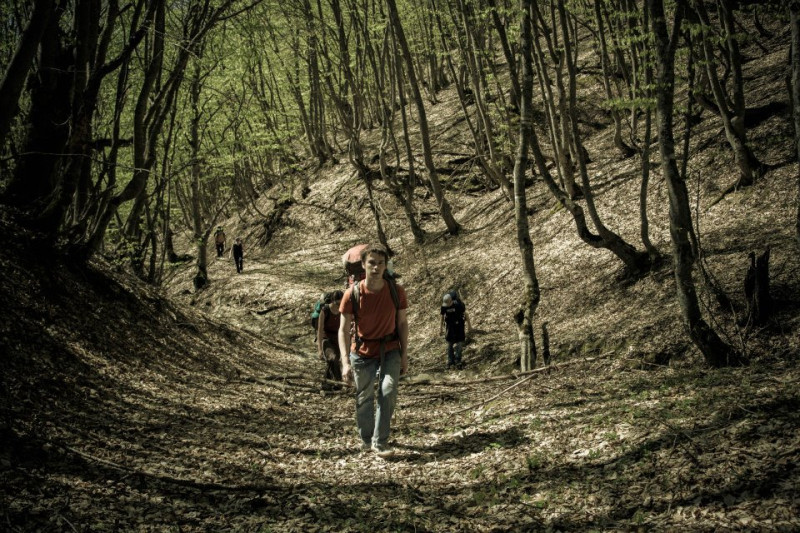
Trekking in South Ossetia
What have you learned from the travellers who you have met?
I learned that people can be really different! But at the same time we are so similar.
Tell us about a few travel experiences in the Caucasus you had which are really memorable.
Once, when I made my first tours in Dagestan we tried to cross an overflowing stream by crossover. And we almost got stuck in the middle of the river. I called people from the area who I knew. They asked friends to come and help us. They arrived in couple of hours, but they could not take us from the river. Our engine finally stalled and we needed something really powerful. We needed a tractor. Friends of my friends crossed the river and went to the nearby village, but one of the tractor drivers was away – in the city and another one had a tractor with floodlights broken. It was night, he could not come. So friends of my friends took my guests on their backs and carried them onto dry land. And the head of the nearest village took us to his house. We were there almost at midnight. His wife started cooking. We were drinking tea and then had nice dinner and a nice talk… We went to bed at about 2-3 in the night. Our host woke up at 5 and started working on his farm, then woke us up, took to the bus going to the city (we were in a hurry to be at the airport on time) and then helped our driver to free our vehicle from the river…
Actually, this is just one of many stories from my life I can tell about hospitality in Dagestan.
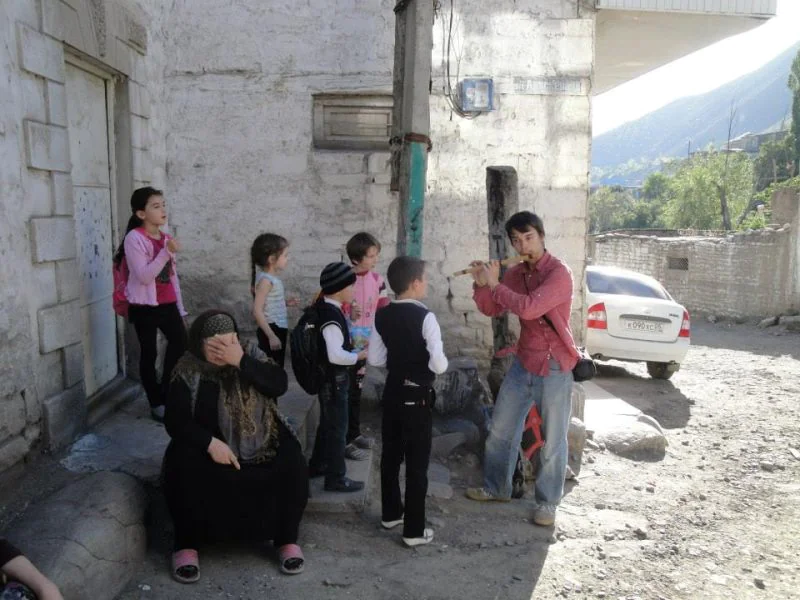
With children in Dagestan
How different are the different cultures of the Caucasus? Can you give us some examples?
Basically the cultures are rather similar. It seems they have one very strong basic element: fantastic hospitality, respect for elders, blood revenge…
And culturally they are rather well connected. A good example is shashka, which appeared in Adyghean society and was adopted by everybody in Caucasus very fast.
But the population of Caucasus was formed by so many strangers during the last thousands of years! They brought and kept their languages. There are representatives of 6 families of languages in Caucasus:
- Abkhazian-Adyghe;
- Kartvelian;
- Nakh-Dagestani (really people living in different villages of one valley speaking languages from this group cannot understand each other sometimes);
- Indo-European;
- Altay;
- Semitic (Assyrian Neo-Aramaic language).
They brought elements of their cultures and thrown them to this melting pot. And also all these nations lived in different political positions and in different natural conditions: Kabardians lived on fertile plains near predatory nomads and above hungry highlanders, Georgians lived in rich valleys, suffering from the re-division of the world by huge empires in the last 800 years, Ossetians had to survive in mountains, surrounded by rich nations with developed feudalism…So it is interesting to notice the differences between nations. The most notable are in dancing and music – they differs very much! Crazy dancing of Vainakhs and restrained dancing of Ossetians… Dancing also shows male and female roles… For example, in Vainakh’s women imitate swans, but in many parts of Dagestan women seem to compete with men or even make them excited by their dance.
And characters are different… When you cross the mountain border from Chechnya to Dagestan you see people become wild, freedom-loving and with a twinkle of humour in their eyes. When you come to Vladikavkaz, you feel you are too fast for this world – they speak so slowly.
Have you travelled far beyond this region? Where would you like to go and why?
To get the answer on your first question you can visit my personal page on TBT. In the next few years I’d like to take my family to Italy (my wife loves pizza) and Albania (I’d like to feel the Mediterranean approach to life, not distorted by the travel industry). Also I’d like to make a long family-trip to Mongolia (for 3-4 months) in my own car. But I don’t have a car and I will have to learn how to drive.
And I’d like to explore Pakistan and go from Pakistan to Western China and then to Tibet and then through all Tibet to South-East Asia. Long journey by hitch-hiking and local buses. Probably only me and my son, when he’ll be at least 6 (now he is 4 years old). And I’d like to explore the Russian North when I feel tired of Caucasus. I’m sure that will happen in a few years. I’d like to explore the ethnography of the Pomor people in Arkhangelsk oblast.
Finally a question we ask many people – if you could invite four people from any period in human history to an imaginery dinner who would they be and why?
I would invite somebody Russian or English-speaking of course. Unfortunately that is my limitation.I would invite Kunta-khadji, the person who brought Sufism to Chechnya and Sergiy Radonezhskiy – the person who followed the tradition of hesychasm (ed’s note: a Greek word meaning stillness, quiet, a mystical tradition of the Orthodox church) and inspired Russian monks to move north establishing sketes (monastic communities) in the 14th century. And also I would invite Thomas Sankara, the leader of Burkina Faso 1983 – 1987 (I hope he spoke English) and one of old men from Ofen’ society, which kept and developed the Russian non-Christian tradition of self-knowledge.
The photographs accompanying this interview and from Dmitry’s private collection.
